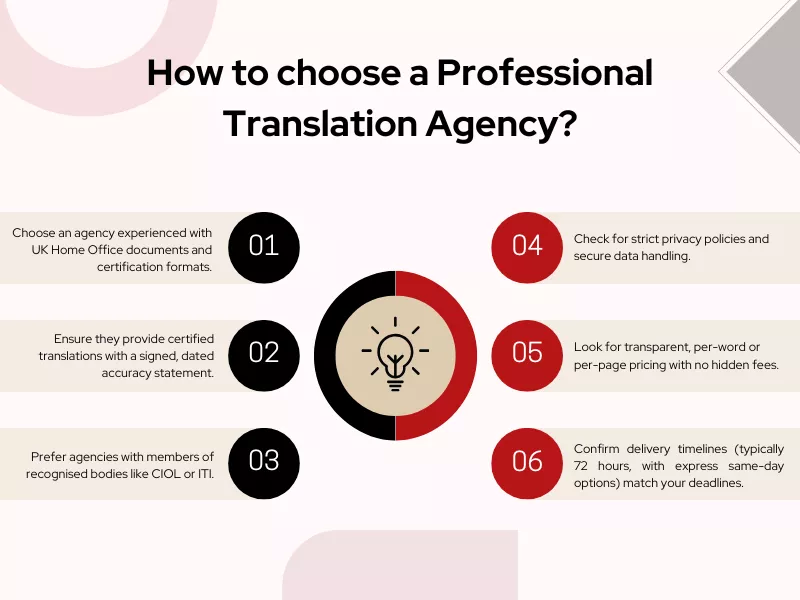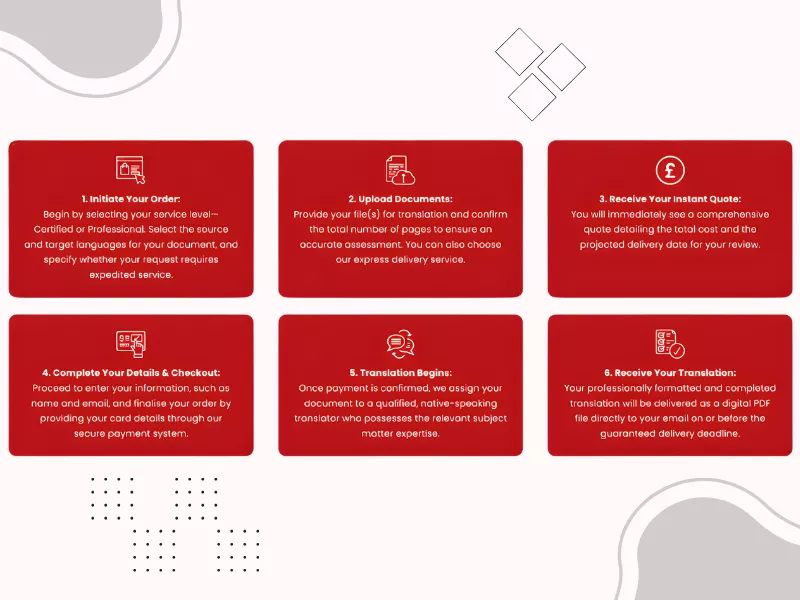In the last year of 2024, UK citizenship applications hit a record high of about 251,000, marking a 6% increase overall. However, the number of citizenship application refusals also rose significantly, with 3,008 rejections reported in 2022, highlighting the need for a perfect application. An important area for attention is the applications involving non-English original documents. In such cases, certified translations are essential to meet the UK Home Office requirements. In this article, we will broadly discuss the role of Translation for Citizenship Applications in the UK and how to navigate the process smoothly.
What Is the Importance of Translations for Citizenship Applications?
This process ensures that all submitted documents are genuine and that the information in the application is accurate. It helps meet regulatory standards and prevents fraud.
If the original language of the required documents is not English or Welsh, translation is required. Accurate translation helps UKVI officials proceed with the verification task, overcoming the language barrier and advancing the citizenship application process.
What Documents Need Translation for Citizenship or Immigration in the UK?

These are the key documents that typically require translation for Citizenship Applications or Indefinite Leave to Remain (ILR) permits in the UK:
Vital Records
- Birth certificates: To prove your identity, date of birth, and parentage.
- Adoption Papers: To legally establish parental relationships, if applicable.
- Marriage Certificates: To validate your marital status and for applications involving a spouse.
- Divorce decrees: To prove the legal dissolution of a previous marriage.
- Death certificates: To prove the death of a spouse, parent, or other relevant family member.
Academic and Professional Documents
- Academic certificates: Official proof of your educational achievements.
- Academic transcripts: Detailed records of the subjects you studied and the grades you received.
- Degree certificates: To confirm completion of higher education.
Legal and Official Documents
- Criminal record certificates / Police clearance: Required from any country where you have lived for 12 months or more in the last 10 years.
- Residency on arrival/visas: Documents proving your legal status and history in other countries.
- Passports: Your current and any previous passports to show your travel history.
- Immigration documents: This includes any visas, biometric residence permits (BRPs), or other official immigration documents issued by the UK or other countries (especially for Dual Citizenship UK application) you have resided in.
- Driving licences: Often used as a form of official identification.
What Are the UK Translation Requirements for Citizenship Documentation?
UKVI mandates document translation for citizenship applications to be certified. Most importantly, you cannot translate and certify your own documents; it must be done by a professional third-party (a certified translator).
The official UK requirements for Citizenship Document translation include
- A certification statement of accuracy: A confirmation that the translation is a complete and accurate version of the original document.
- Translator’s credentials: Translator’s full name, signature (or translation company official’s signature), and contact information.
- Date of translation: The date the translation was completed must be included.
What Are the Consequences of Inaccurate Translation or Self-translated Documents?
If you fail to meet the specific requirements for citizenship document translation set by the authorities (e.g. providing self-translated or erroneous documents), you will face consequences like-
- Outright rejection of the application
- Unnecessary delays in the citizenship process
- Incurring extra costs
Apart from these, it also welcomes indirect issues. For example, errors in legal documents are bound to happen if a professional with special expertise in legal terminology and native fluency is not involved. Such mistakes may lead to misinterpretation, give unfair advantage to others, or even result in a lawsuit for breach of contract.
These blunders can also affect your visa eligibility or even the validity of your case. Lastly, if UK government authorities or legal professionals lose trust in your documents, it can damage your credibility and create a negative impression that’s hard to undo.
How to Get Started with Document Translation for Citizenship or Visa Application?
Therefore, to avoid delays or rejections, it is essential to work with a Certified Translation Service provider. To get the job done properly, follow these 4 key steps:
Step 1: Look for a Professional Translation Agency

Start looking for professional translation service providers online. Translation.co.uk is one of the best translation services for citizenship documents, ticking all the above boxes. Here you can connect with multilinguist and accredited translators who offer accurate and legally-compliant personal, professional and legal translation for citizenship applications. Their translated copies are accepted by
- UK Home Office and UKVI
- HM Passport Office
- General Medical Council (GMC)
- General Dental Council (GDC)
- Nursing and Midwifery Council (NMC)
- Driver and Vehicle Licensing Agency (DVLA)
- All UK Universities and Academic Institutions
With more than 150 language pair options to choose from, you easily find an expert who is not only proficient in English but also speaks your native language. With the fastest turnaround times, reasonable pricing, and privacy protection, they ensure top-notch language solutions for all purposes!
Step 2: Place an Order for Certified Translation Services
Once you have chosen your service provider, it’s time to place an order. Here’s a pre-checklist before you start the translation-
- Arrange all the essential documents in one place, including those required for special cases like applying for citizenship by descent, which requires documents that establish a legal link between you and your British ancestor.
- Make sure the information (e.g. full name spelling, date of birth, address, nationality, and other key details) is consistent across the documents.
- If an application is stolen, lost, too damaged to interpret or has errors, it is advised to apply for a certified copy from the state office of your own country first and then provide it for translation. You can even read our blog on What to Do If You’ve Lost Birth Certificate for reference.
Once you have ticked all these boxes, you are ready to place an order. Different service providers have varying order-taking processes. If proceeding with Translation.co.uk, their simple online ordering steps for citizenship document translation services are:

Step 3: Cross-check Your Translated Documents
Once you receive the translated files from the agency, do not submit them immediately. While working with a certified translator for citizenship documents hardly leads to any mistakes, you should still take the final task to review as a personal responsibility.
This final check is a crucial step that gives you peace of mind before you submit your application.
Step 4: Ask for Revisions (If Corrections Needed)
If you find an error during your review, don’t panic. Professional agencies like Translation.co.uk are committed to accuracy and offer free revisions quickly as part of their service guarantee. Once you have the revised, flawless copy, you are ready to include it in your citizenship or visa application package with confidence.
How to Submit Your Translated Documents?
For most UKVI applications, you will be submitting documents online. To do this correctly, you must scan both the original document and its corresponding certified translation into a single file (usually a PDF). Always place the original document first, followed immediately by its translation.
Conclusion
The process for obtaining British citizenship requires careful attention to detail, and certified translation is a non-negotiable step. With rejection rates on the rise, a professionally translated application is essential for meeting strict UK Home Office standards. By investing in an expert service, you eliminate the risk of critical errors and costly delays. Don’t let a preventable language barrier jeopardise your future; ensure your documents are flawless to give your application the strongest possible chance of success.
Frequently Asked Questions
Do I Need a Sworn Translation for a UK Citizenship Application?
No, the UK Home Office does not specifically require a sworn translation. While a translation from a sworn translator (a translator officially appointed by a court in their country) is acceptable, the standard UK requirement is for a “certified translation.”
Do Translation Requirements for UK Citizenship Application Require Notarisation?
No! Notarisation, which verifies the identity of the person signing the document, is an extra step that is not typically mandated by UKVI for citizenship applications.
Should My Foreign Documents Be Apostilled Before Translation for a British Citizenship Application?
For UK citizenship applications, the Home Office (UKVI) does not have a strict, universal requirement that all foreign public documents must be apostilled. The primary concern for UKVI is the document’s authenticity.
However, getting an apostille is a highly recommended “best practice.” An apostille is a certificate attached to your original document by the government of the country that issued it (if they are a member of the Hague Convention). It serves as an official, international verification of the document’s signature and seal.
If your original document has an apostille, the apostille itself must also be translated along with the main document. The entire document package (original text and apostille) should be translated together as one and then certified.
Can I Use a Translator Who Is Based Outside of the UK?
Yes, you may use a translator based outside the UK, as long as the translation complies with the specific requirements of the UK authority you are submitting it to. What matters is proper certification and the ability to verify the translator’s credentials, not where they are located. However, for non-UK translators, the only condition is that the translator must be a member of an official professional body in their own country (a “sworn translator” from a civil law country, for example). Still, it is recommended to check the requirements of the respective department when submitting to avoid unfavourable circumstances.
What Is the Cost of Certified Translation Services for Citizenship Applications?
The cost of Certified Translation Services for Citizenship Applications varies based on document volume, complexity, language pair, and turnaround time. At Translations.co.uk, certified translations start from £30/page.
- Academic Transcript Translation UK: A Complete Guide - 27th January 2026
- Translation for Citizenship Applications: British Visa Rules and Requirements - 20th November 2025
- Expert Guide: Dual Citizenship UK Explained - 13th September 2025












